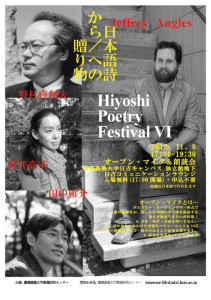Kaimana Review for Adele Ne Jame’s The South Wind
December 25, 2012
(from KAIMANA 2012, Paul Nelson, editor.
Hawai’i Literary Arts Council)
by Alan Botsford, editor of Poetry Kanto and author of Walt Whitman of Cosmic Folklore
In an evidence-based world, we are forever trying to solve the puzzle of the play of appearances and trying to fit the pieces into place. For the poet, however, the pieces won’t fit, the puzzle will never be solved. Out of depths Orpheus-like and at the borders Janus-faced, Adele Ne Jame travels as exile and maker in an exploratory trajectory between seen and unseen, alive to the always-changing pathways towards the sayable. In The South Wind, a new collection of graceful, exquisitely-wrought poems, she navigates her way through the winds of loss, violence, and the ravages of history–via lament and mourning–towards the possibilities of new life. Each poem marks a destination reached that is hard-won, hard-earned, composed of the poet’s alchemic power, emotional steadiness, and spiritual nimbleness. And each destination marks a recovery, however provisional, through poetic remembrance and verbal music, of what time and war have undone.
In the poem “The World is a Wedding,” for example, Ne Jame in three steely-eyed, deft stanzas captures the dynamics of her late parents’ domestic life in New Jersey. The scene she depicts, while evoking their Lebanese origins, is an extended family’s meal together as they recount stories of exotic travels. In the final stanza, with the visiting whirlwind of uncles and cousins now departed from the house, Ne Jame offers this glimpse:
When the house is empty
Mother sits alone
in front of the T.V. watching
an old movie, the hero smoking a cigarette.
Father’s already asleep in the small room
off the kitchen, having given himself up
to the next small loss, to King’s Display
where in a shabby darkroom on West 45th Street
he will develop more prints
for the movies, ten-foot blowups of stars,
heroes on the marquee, the crowd passing by.
In the poem, Ne Jame’s progenitors remain real and hauntingly present to her. Indeed the archetypal Father will be forever among the “ten-foot blowups of stars,/ heroes on the marquee.” Yet the poem’s coup de grace occurs with the implication that the poet herself joins “the crowd passing by” in order to escape the Father’s shadow (History by any other name), an escape which, as Abraham Lincoln famously said, is impossible. If, then, the poet meets the requirements of a historical reality all too ready and willing to assert its control over the poetic imagination, it is a trade-off the poet consciously makes. Being bound thus to memory also frees up energy available to her as poet and is a function of the way she chooses to relate to the world.
You could say she harnesses the elemental wind to her poetic craft, intending the energies of a poem to be felt for what they are—modes or nodes of realization, not only of representation. When bringing such awareness into language, the poet as maker almost has to step aside, for a very clear force is writing through her, one that would declare: I have mastered the art of leaving, I perceive the forms and change them. The hugeness of the heart and vision, in other words, is mindfulness in action. We can learn much from this poet. She touches the nerve of our humanity and looses a freedom our hearts cry out for. We can, her poems remind us, vitally wake up to the voice we hear at dawn.


